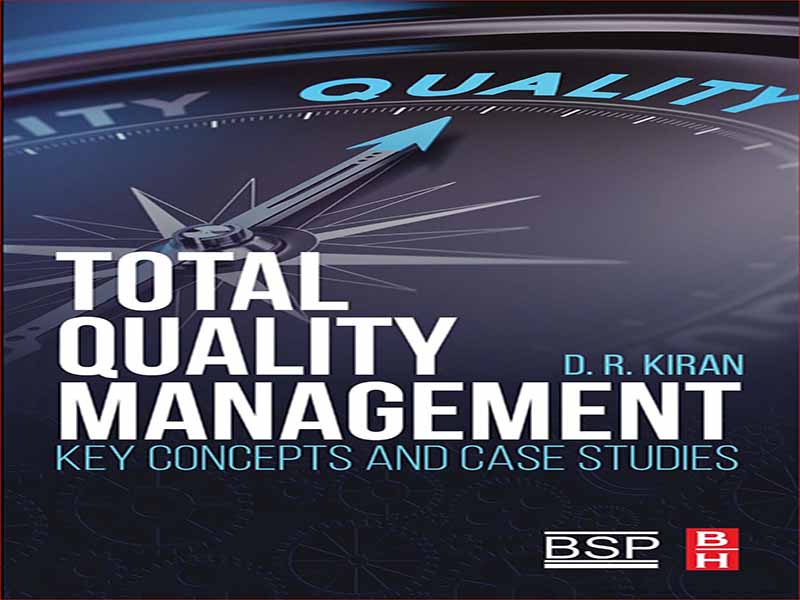- عنوان کتاب: Total Quality Management: Key Concepts and Case Studies
- نویسنده/انتشارات: Prof. D.R. Kiran
- حوزه: مدیریت کیفیت
- سال انتشار: 2017
- تعداد صفحه: 562
- زبان اصلی: انگلیسی
- نوع فایل: pdf
- حجم فایل: 15.6 مگابایت
تقریباً در کل دوره از انقلاب صنعتی تا حوالی جنگ جهانی دوم، آلمان در اوج تولید با کیفیت کالاهای صنعتی، به ویژه در بخش خودرو، باقی مانده بود که در مراحل بعدی ایالات متحده و سایر کشورهای اروپایی به آن پیوستند. پس از سال 1950، ژاپن دریافت که تولید با کیفیت تنها وسیله افزایش اقتصاد آنها از طریق صادرات کالاهای صنعتی است. از طریق کمک گوروهای باکیفیت مانند شوهارت و دمینگ، در تولید با کیفیت از همه کشورهای دیگر پیشی گرفت و به هدف تبدیل شدن به مظهر قوانین و اعمال کیفیت دست یافت. در سالهای پایانی قرن بیستم، آزادسازی اقتصادی در هند منجر به واردات آزادتر کالاهای صنعتی شد و صنعت هند مجبور شد برای رویارویی با رقابت بینالمللی تا حد زیادی بر تولید با کیفیت تمرکز کند. این نیاز و همچنین داستان موفقیت ژاپن در غلبه بر رقابت سخت ایالات متحده و اروپا، به جنبش کیفیت در هند و سایر کشورهای آسیایی شتاب بخشید. تا سال 2010، هند می تواند در کسب چندین جایزه دمینگ، از تمام کشورهای آسیایی دیگر در کنار ژاپن پیشی بگیرد. با این پیشینه، این کتاب به اصول و شیوه های مدیریتی می پردازد که بر عملکرد کیفیت حاکم است. اگرچه چندین کتاب در مورد مدیریت کیفیت در دسترس است، اما تعداد بسیار کمی وجود دارد که به تمام جنبه های کنترل و مدیریت کیفیت هم در عمل و هم در برنامه های درسی دانشگاه در سراسر جهان می پردازد. با توجه به این موضوع، من مایل بودم که تمام موضوعات مرتبط با مدیریت کیفیت را که در چندین سیلابس دانشگاهی مشخص شده و تدریس می کردم، در یک کتاب واحد آورده و مطالعات موردی را بر اساس تجربیات خود ارائه دهم و این نتیجه تلاش من است. از این رو به این کتاب به درستی عنوان مدیریت کیفیت جامع – مفاهیم کلیدی و مطالعات موردی داده شده است. ویژگی خاص این کتاب اهمیت دادن به مبانی آمار است، به طوری که خواننده برای درک بهتر موضوع حیاتی کنترل کیفیت آماری کاملاً مجهز است. جدای از پرداختن به سیستمهای کیفیت و استانداردهای سری ISO 9000، ویژگیهای سیستمهای مدیریت زیستمحیطی در سری ISO 14000 نیز مورد توجه قرار میگیرد تا تأثیر قابل توجه محیط بر تولید کیفیت را برجسته کند. فصلی در مورد مدیریت ناب اضافه شده است تا مشخص شود که منابع کمیاب باید فقط برای ایجاد ارزش مورد نیاز برای یک محصول صرف شود و نه در غیر این صورت. من که خودم یک مهندس صنایع هستم که روش های مطالعه و مهندسی ارزش را تمرین کرده ام، سعی کرده ام این تکنیک های سنتی مهندسی صنایع را توضیح دهم و آنها را با مفاهیم مدرن کایزن، DFSS و غیره مرتبط کنم. در پایان هر فصل، اشاره ای طنزآمیز و حکایتی به موضوع فصل به عنوان “در سمت سبک تر” ارائه شده است. برنامه های درسی از حدود 20 دانشگاه و موسسه هند و همچنین دانشگاه های بین المللی برای ترسیم طرح کلی این کتاب جمع آوری شد.
Almost during the entire period from the Industrial Revolution to around the Second World War, Germany had remained at the pinnacle of quality production of industrial goods, especially in the automobile sector, joined during the later stages by the United States and other European countries. Post-1950, Japan realized that quality production was the only means to increase their economy through export of industrial goods. Through the help of quality gurus like Shewhart and Deming, it overtook all other nations in quality production and achieved the goal of becoming the epitome of quality precepts and practices. During the later years of the 20th century, the economic liberalization in India led to freer imports of industrial goods, and Indian industry has been forced to concentrate to a larger extent on quality output to face the international competition. This need, as well as the success story of Japan in overcoming the stiff competition from the United States and Europe, gave a momentum to the quality movement in India and other Asian nations. By 2010, India could overtake all other Asian nations next to Japan in garnering several Deming awards. With this background, this book deals with the management principles and practices that govern the quality function. Though several books on quality management are available, there are very few that deal with all the aspects of quality control and management both in practice, as well as prescribed in university syllabi around the world. In view of this, I desired to bring all quality management-related topics specified in several university syllabi, and which I have been teaching, into a single book, providing case studies based on my experience, and this is the result of my effort. This book is hence aptly given the title of Total Quality Management—Key Concepts and Case Studies. A special feature of this book is the importance given to the fundamentals of statistics, so that the reader is fully equipped to better understand the vital topic of statistical quality control. Apart from dealing with the Quality systems and standards of the ISO 9000 series, features of the environmental management systems per ISO 14000 series are also dealt with, to highlight the significant impact of the environment on quality production. A chapter on Lean Management is added to highlight that the scarce resources must be expended only for creating the required value to a product and not otherwise. Being an industrial engineer myself having practiced methods study and value engineering, I have attempted to explain these traditional Industrial Engineering techniques, relating them to the modern concepts of Kaizen, DFSS, etc. At the end of each chapter, a humorous and anecdotic reference to the theme of the chapter is given as “On the lighter side.” Syllabi from around 20 Universities and Institutions of India, as well as International Universities were collected to draw the outline for this book.
این کتاب را میتوانید از لینک زیر بصورت رایگان دانلود کنید:
Download: Total Quality Management: Key Concepts and Case Studies




































نظرات کاربران